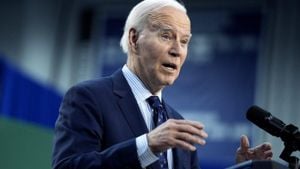China's recent educational and economic expansions are making waves on the global front, with significant developments highlighted by multiple initiatives aimed at fostering local and international engagement. A warm spotlight shines on the "China: An Opportunity, Chongqing Brands" global promotion series, which took place from November 5 to 8, 2024, and garnered notable interest across Latin America.
Held primarily in Lima, Peru, and São Paulo, Brazil, this series brought together local officials, business leaders, media, and scholars to showcase the vibrant culture and thriving industries of Chongqing, one of China's most prominent cities. Joseph Cruz Soriano, a respected Sinologist from Peru, kicked off the event with words delivered in the local Chongqing dialect. This set the stage for fruitful discussions about fostering connections between Chongqing and Latin American markets.
Guan Hong, the Executive Deputy Director of the Publicity Department of the CPC Chongqing Municipal Committee, noted the ambition behind the promotion – to strengthen bilateral trade, cultural exchange, and investment opportunities. The impact was palpable, with representatives from the automotive industry showcasing success stories. Erik Mitsuo from Inchcape Peru highlighted the success of Changan Automobile Peru, which reported sales of 6,153 units from January to September 2024, placing it at the top of Chinese brands and fourth overall within the Peruvian automotive market.
Further enriching the conversations were Liu Qingqing, Director of the Publicity Department of Dazu District, and Paulo Braga, Vice General Manager of the Chongqing Polycomp International Brazil Branch, who presented the historical significance of cultural landmarks and business expansions within Brazil, respectively. Braga reflected on the investments made by Chongqing companies, emphasizing the strategic nature of these initiatives and affirming their commitment to establishing solid foundations within these new markets.
Academic cooperation took the spotlight as Tang Yishin, a professor at the University of São Paulo, shared insights about the current state of higher education within Brazil. He posited significant avenues for collaboration – especially between Chongqing's advancements in artificial intelligence, engineering, and environmental sciences.
Against this backdrop of cultural and economic exchange, China is also making strides closer to home. One notable development is the announcement by A Good University based in Sanya, Hainan, offering its Unconditional Master’s Degree Full Scholarship Program for 2025. Open to international students, the program will cover full tuition and living expenses, with applications still being accepted until December 30, 2024.
This program, characterized by no language proficiency requirements, aims to attract global talent to partake in various disciplines, including artificial intelligence, finance, and sustainable tourism management. This initiative not only positions China as an appealing destination for advanced studies but also fosters global networks of educational cooperation.
Interestingly, the rising focus on vocational education is illuminated through various studies examining the educational paths of economic giants like China and India. A study published by the Paris School of Economics reveals contrasting approaches influencing the growth trajectories of both nations. The findings suggest India’s historical emphasis on humanities – cultivated during colonial times – has hindered its economic advancement, especially compared to China's vocational focus.
The researchers delineated three core differences: the mode of educational implementation, prioritization of quality versus quantity, and the diversification of disciplines within vocational training. Crafted from analyses of educational surveys spanning over 120 years, these findings paint a clear picture – as stated by the authors, “China’s educational development path has been more closely aligned with the goal of fostering economic growth.” This paradigm shift occurred prominently after China embraced vocational education around the 1980s, leading to accelerated growth rates and reduced economic inequality.
Following this trend, Tongji University has now unveiled its own initiative, CivilGPT, aimed at enhancing individualized learning pathways for civil engineering students. This generative AI tool offers personalized assistance, integrating vast educational resources to help students tackle interdisciplinary engineering challenges. Zheng Qinghua, President of Tongji University, outlined the ambitious vision of the tool, emphasizing its role as a significant asset in eleving national talent cultivation and educational quality.
By spanning such diverse initiatives – from cultural promotions and global scholarships to vocational education reforms – China continues to navigate its potential as both an educational and economic powerhouse. The recent developments serve as formidable stepping stones for international engagement and collaborations, especially within rapidly growing markets.
The increasing emphasis on interconnectedness and innovation echoes throughout various academic and industrial domains, with hopeful anticipation for future partnerships paving pathways to mutual growth and shared successes.



